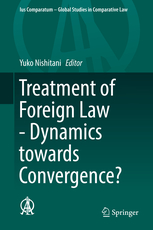Out now: Yuko Nishitani (ed.), Treatment of Foreign Law – Dynamics towards Convergence? (2017)
T he book Treatment of Foreign Law – Dynamics towards Convergence? (Springer, 2017), edited by Professor Yuko Nishitani, has just been published. It includes one general report and 30 national reports on the treatment of foreign law in diverse jurisdictions. Additionally, the book includes a report by the Hague Conference on Private International Law on the state and progress of its envisaged project on the treatment of foreign law. The general report and most of the individual reports were prepared for the 2014 Conference of the International Academy of Comparative Law held in Vienna.
he book Treatment of Foreign Law – Dynamics towards Convergence? (Springer, 2017), edited by Professor Yuko Nishitani, has just been published. It includes one general report and 30 national reports on the treatment of foreign law in diverse jurisdictions. Additionally, the book includes a report by the Hague Conference on Private International Law on the state and progress of its envisaged project on the treatment of foreign law. The general report and most of the individual reports were prepared for the 2014 Conference of the International Academy of Comparative Law held in Vienna.
The abstract reads as follows:
This work presents a thorough investigation of existing rules and features of the treatment of foreign law in various jurisdictions. Private international law (conflict of laws) and civil procedure rules concerning the application and ascertainment of foreign law differ significantly from jurisdiction to jurisdiction. Combining general and individual national reports, this volume demonstrates when and how foreign law is applied, ascertained, interpreted and reviewed by appeal courts. Traditionally, conflicts lawyers have been faced with two contrasting approaches. Civil law jurisdictions characterize foreign law as “law” and provide for the ex officio application and ascertainment of foreign law by judges. Common law jurisdictions consider foreign law as “fact” and require that parties plead and prove foreign law. A closer look at various reports, however, reveals more differentiated features with their own nuances among civil law jurisdictions, and the difference of the treatment of foreign law from other facts in common law jurisdictions. This challenges the appropriacy of the conventional “law-fact” dichotomy. This book further examines the need for facilitating access to foreign law. After carefully analyzing the benefits and drawbacks of existing instruments, this book explores alternative methods for enhancing access to foreign law and considers practical ways of obtaining information on foreign law. It remains to be seen whether and the extent to which legal systems around the world will integrate and converge in their treatment of foreign law.
Highly recommendable!
Further information, including a table of contents, is available here.


